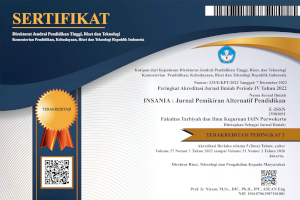Relevansi Standarisasi Pembelajaran Dan Penilaian Pada Kurikulum 2013 Dengan Konsep Perbedaan Individu Peserta Didik
DOI:
https://doi.org/10.24090/insania.v22i1.1511Keywords:
assessment, standards, learners, learningAbstract
Abstract: This paper examines the relevance of standardization in the process of learning and assessment to the curriculum 2013 with the concept of individual differences in learners. It then raises two questions. First, whether the learning and assessment is in the standard curriculum. Second, can the learning and assessment is in a standardized curriculum perspective when faced with the concept of individual differences in learners. Discussion of the results showed that the learning and assessment in the perspective of standards curriculum or have standards. But when confronted with the concept of individual differences in learners, learning and assessment less suitable to be standardized. It should be a paradigm shift in the organization of learning, the learning paradigm based on the standard into the learning paradigm based on individual differences. Keywords: learning, assessment, standards, learners.Downloads
References
Lampiran Permendikbud Nomor 65 Tahun 2013 tentang Standar Proses Pendidikan Dasar dan Menengah.
Lampiran Permendikbud Nomor 66 Tahun 2013 tentang Standar Penilaian Pendidikan.
Lampiran Permendikbud Nomor 81A Tahun 2013 tentang Implementasi Kurikulum.
Majid, Abdul. 2014. Pembelajaran Tematik Terpadu. Bandung : Rosda.
Munthe, Bermawi. 2009. Desain Pembelajaran. Yogyakarta : Insan Madani.
Downloads
Published
How to Cite
Issue
Section
License
Authors who publish with this journal agree to the following terms:
Authors retain copyright and grant the journal right of first publication with the work simultaneously licensed under a Creative CommonsAttribution-ShareAlike License that allows others to share the work with an acknowledgment of the work's authorship and initial publication in this journal.
Authors are able to enter into separate, additional contractual arrangements for the non-exclusive distribution of the journal's published version of the work (e.g., post it to an institutional repository or publish it in a book), with an acknowledgment of its initial publication in this journal.
Authors are permitted and encouraged to post their work online (e.g., in institutional repositories or on their website) prior to and during the submission process, as it can lead to productive exchanges, as well as earlier and greater citation of published work (See The Effect of Open Access).








